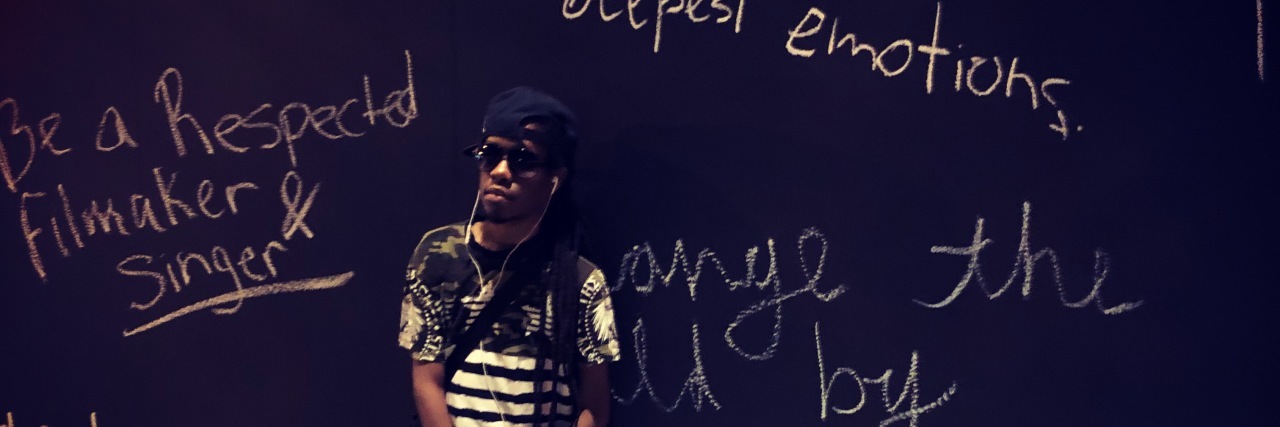Why Being a Black Man With Cystic Fibrosis Made Me a 'Needle in the Haystack'
Editor's Note
Join The Mighty’s Spoonie Life Hacks group to get tips for tackling everyday tasks from people living with chronic illnesses — or to share your own hacks!
I am a 23-year-old male living with a rare disease called cystic fibrosis (CF). To make things even more interesting, I am a 23-year-old Black male living with cystic fibrosis who had received a double lung transplant during the spring of 2017.
My CF journey is not too far off from other stories you hear. I was diagnosed a year after birth, as doctors could not figure out what was making me so symptomatic. At first, they didn’t come to the conclusion that I may have CF because in their view, it was “uncommon” for people of color to inherit such a genetic disease. After a year of seeing a multitude of doctors, practitioners, and other specialists, I was finally referred to a major children’s hospital called Sick Kids Hospital in Toronto, Ontario. There, they did a sweat test on me, and finally diagnosed me with cystic fibrosis. Currently, the testing for CF relies on genetic variants collected primarily from the white population; little is known yet about the variants that cause CF in non-white populations. After doing a family background analysis, it was discovered that I do have white European ancestors on both sides of my family, which is why I was able to get a correct diagnosis.
As a child, I experienced various ups and downs growing up. Other than my younger brother, I didn’t know anyone else who had CF, nor did many people at the time know what CF really was.
Without anyone to possibly relate to, I felt isolated.
For a long time, I didn’t know how to deal with this fact. What made things even worse for me was that all my peers, classmates, and friends were all relatively healthy–none of them were chronically ill. Knowing this, as a child, I tried to live as close to their reality as possible, even if it proved damaging to my health in the long-term. I wanted to be “normal” like everyone else around me. I wanted to be a healthy kid who didn’t have to worry about taking medications every 12 hours or completing a nearly two-hour nebulizer regiment twice a day. This would be a part of my daily life for nearly 20 years until I eventually received a double lung transplant in 2017.
Most of my life I had always felt like an outcast, not knowing anyone who shared the same experiences as me.
Even as I got older, and became more educated and connected within the Canadian CF community, I still could never find someone I could fully relate to – someone who looked like me.
Everyone I had met who had CF (virtually), were predominantly white patients of European descent. I have met only one person of color who has CF that is also my age; her background is Guatemalan. I love her to death, and glad she is a part of my life, but the fact still remained: she looked nothing like me. In hindsight, feeling like I was the only one of my kind made me a lot more resilient living with CF.
As I grew older and more aware of the realities that surround cystic fibrosis, I became more dismissive of my realities and a future living with CF. I knew I was considered a “needle in the haystack,” so I thought that maybe the most common outcomes with CF wouldn’t happen to me because I wasn’t like the “typical” individual living with CF.
It turns out, I was worse off than your standard CF patient.
I believed that my skin color gifted me a certain amount of immortality against this “white man’s” disease, as the world had led me to believe. I had heard of people with CF whose lung function hovered in the 20 percent range (based off of pulmonary function tests), who were close to being immobile. In my late teens, when my lung function percentage was in the 20s, I was still able to go to school and work a part-time job with some obvious difficulties, but there was nothing CF held me back from doing. It may have taken a bit more energy, or taken me a little longer than average. But I still lived and continued to live as best I can, until I couldn’t. My blackness made me feel like Superman’s kryptonite, and it was this thinking that led to my insufficient ability to care for myself at different points in my life.
Now that I am older, in hindsight, I believe that if I was exposed to other individuals who fought the same fight as me at such a young age, maybe I would have been a lot less resilient towards taking care of myself adequately and sufficiently. Maybe if I was exposed to such, I wouldn’t have needed a double lung transplant in 2017 and I wouldn’t be here thinking of ways to express my earlier years of life living with cystic fibrosis. Maybe if… things would have turned out unbelievably different.
However, I am a product of my surroundings and upbringing, and I am not ashamed to admit it.
To anyone in the rare disease community who feels like an outcast because you “look” different from the other patients in your community, you’re not alone. Your journey matters. Find solace in being the needle in a haystack, and realize you can be the catalyst for change in someone’s life.
Love the life you live. Live the life you love.

